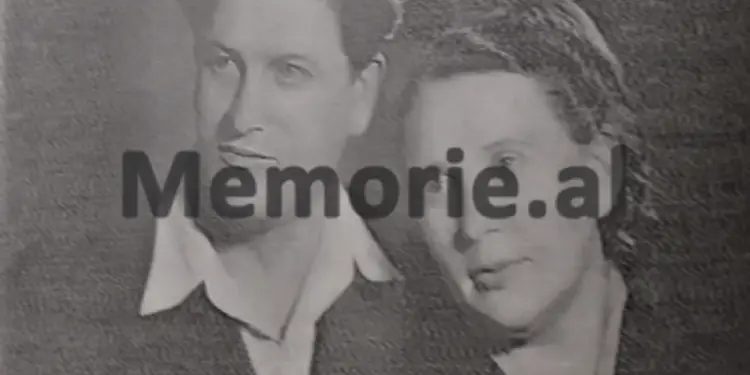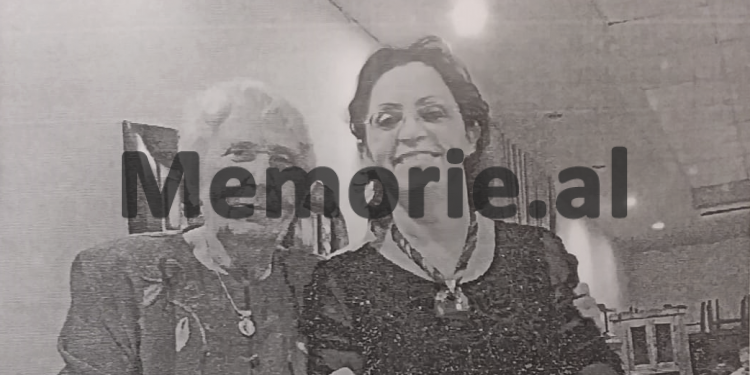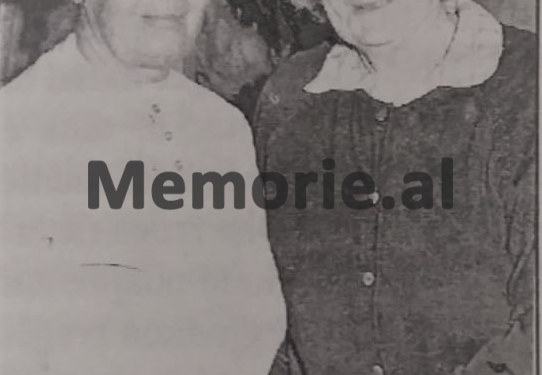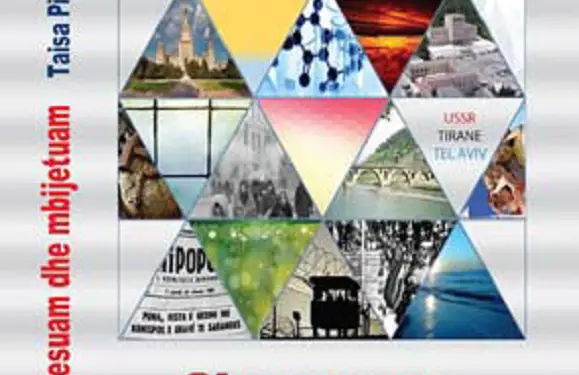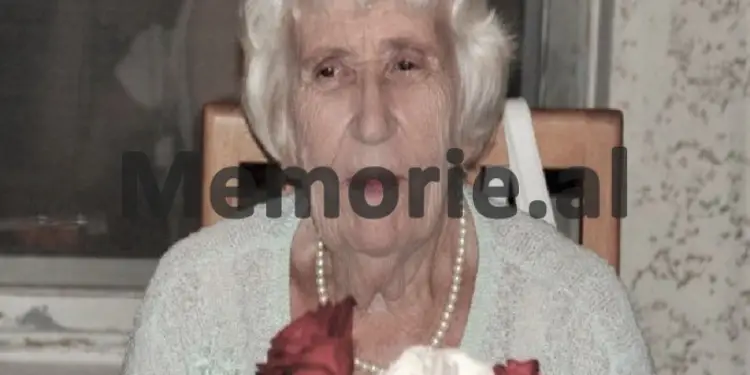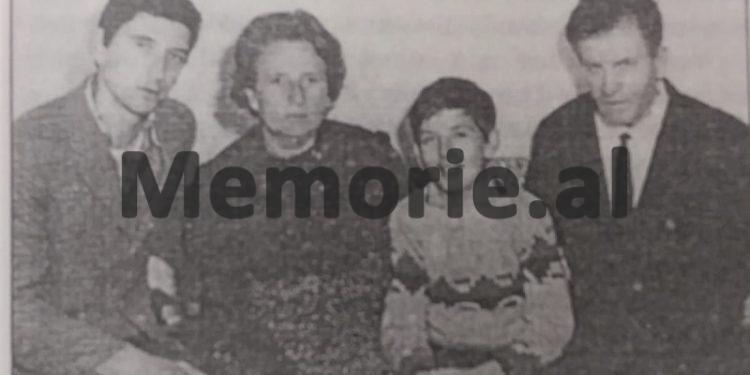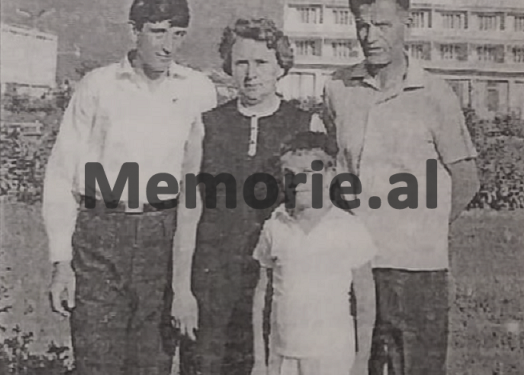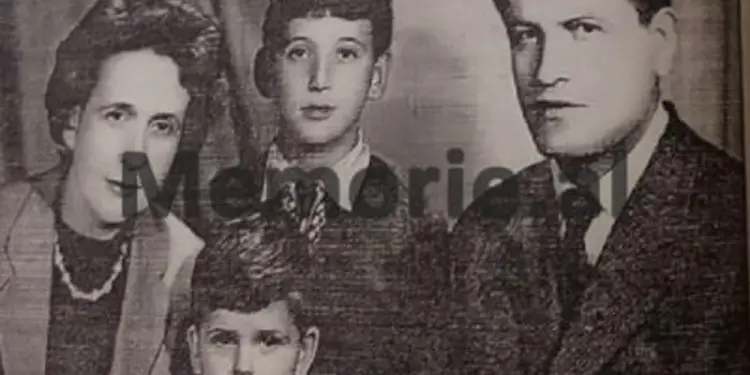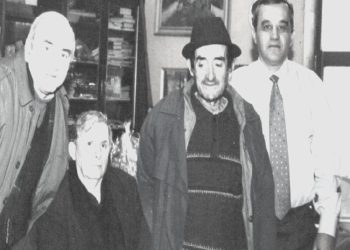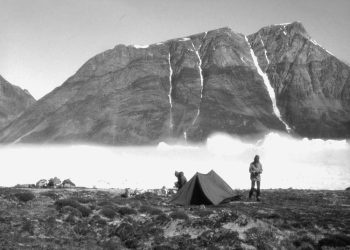By Taisa Pisha Batkina
The fourth part
Memorie.al/ publishes the unknown story of the Russian Taisa Batkina (Pine), originally from Tula, Russia, the third child of a very poor rural family, who was left an orphan at a very young age, after her father lost her life while working in one of the coal galleries on the outskirts of Tula, where he worked as a miner (shortly after escaping arrest, accused of “supporting the enemies of the people”) and she grew up with difficulty great economic, as their city continued to be under the bombardment of German forces, which had reached as far as near Kursk. Taisa graduated from the Faculty of Chemistry, near the ‘Lomonosov’ University of Moscow, where she met and married the Albanian student, Gaqo Pisha, originally from the city of Korça, who at that time was studying at the Faculty of Philosophy in Moscow and both together in 1957, they returned to Albania, together with their newborn son, Sasha, where they began life in the city of Tirana, Taisa was appointed as a professor of Chemistry at the State University of Tirana, while Gaqo, in the chair of Marxism- Leninism, where they worked until 1976, when the State Security arrested Taisa Batkin on fabricated charges, accusing her of being a “Soviet KGB agent” and sentencing her to ten years in political prison, which she suffered. in the “Women’s Prison” in the city “Stalin”, from where she was released in 1986, while her husband, Gaqo Pisha, had died in 1983, from a serious illness. The tragic story of Taisa Batkina (Pine), in the inhuman camps and prisons of Enver Hoxha’s communist regime, where she spent a decade of her life, along with many compatriots from the former Soviet Union, or other Eastern European countries, comes through her memories, published in a book entitled “We hoped and survived”, memories which, her son, Aleksandër Pisha, kindly offered her for publication, in Memorie.al
We hoped and survived
I dedicate it to the bright memory of my husband, GAQO PISHA
This is a book of memories. In it I want to tell about my life and that of my friends, Soviet women, who tried prison for several years just because they got the courage and got married and linked their fate with that of Albanian students. The prison was part of the great GULAG in the small Balkan country, Albania, where for many years the bloody communist regime of Enver Hoxha ruled, who was a loyal student of Stalin and a follower of his cause.
Through this book I would like everyone to learn about the inhuman trials we experienced and the horrible years we spent in Albanian prisons, just because we… fell in love! And let no one ever forgets what totalitarianism, despotism is and what the consequences of this system are.
Continued from the previous issue
Here I will make another retreat in time. My husband belonged to the generation of Albanian youth who had sincerely believed in the ideas of communism. They hoped that the Communist Party, after taking power, would build a new life in the country, strengthen independence and develop the economy. The propaganda trumpeted that in the Soviet Union, socialism had been built, that a world without exploiters and criminals had been set up there, all people lived prosperous and happy. This Albanian youth, these enthusiasts, constituted the main skeleton of the party and the National Liberation Army during the War and in the first years after its end. They worked where it was most difficult, they tried to learn to bring more benefits to the country. But slowly they too began to be convinced that all their ideals and dreams were sand castles…! They saw that the persecutions in the country were not over, that the party politics had nothing to do with the ideals for which they had fought. From the first days of the establishment of the communist regime in Albania and during all the years of the leadership of the Labor Party, led by Enver Hoxha, the trials, persecutions, shootings were not interrupted in the country. At first they disappeared or put in prisons, those who fought against the partisans and those who called them bourgeois, exploiters. In small and poor Albania, where there was no industry, such were considered traders and owners of small enterprises. Intellectuals or representatives of the clergy were also persecuted. After the breakdown of relations with Yugoslavia in 1948, the heads of those who had worked or studied in this country, or who had relatives there, flew. The people who once chanted Tito-Enver-Stalin! ”Now had to curse Yugoslavia, praise the Soviet Union, chant” Enver-Stalin “, and after Stalin’s death shout” Enver-Khrushchev “!
This work continued until the early 1960s, before the breakdown of relations between Albania and the Soviet Union. Then it was dangerous to speak well of the Soviet Union, or to mention Khrushchev’s name. A kind word about something to do with the Soviet Union could be the cause of any kind of persecution, up to arrest. The composition of the party also changed hand in hand. Most of its members were now careerists, flatterers, hypocrites, and people without principles, without morals. The people did not trust them, but they were also afraid. They became production managers, brigadiers. No knowledge or skills for work were required of them. It required a willingness to carry out any order or instruction without words, to instill in the minds of the people the indisputable advantages of the socialist order, the infallibility of the party and government leaders, who did everything for the people, were “servants of the people.” Although Albania officially called the Soviet Union its enemy, state, economic, or party policies were modeled on the Soviet Union, its great brother and teacher. Class hatred was preached in the country, espionage and betrayal were incited. 20 People in power taught the people not to discriminate, in the means of ensuring the achievement of the goal, to be savage.
The propaganda of the theory of the continuous strengthening of the class war left open the field for persecution and sowed enmity among the people. The whole system was based on fear, dogmatic slogans, deception and misinformation of public opinion. You can get the information only from Albanian sources. Wherever lies reigned, she accompanied man from kindergarten to the end of life. Triumphant slogans announced achievements to which no signs were visible. Life in the country was getting worse by the day. Deficiencies and failures were justified by hostile activity and sabotage. Thus, terror, the system of intimidation through mass persecution, arrests, internments, executions of innocent people, denial of the meaning of justice bore fruit. The people were so frightened that in their souls there was no terror before the power, before the “security guards”, these “zealous and omnipotent seekers”, of crimes and criminals. Such a system was created in the country, where for most the meaning of the term “personal security” was excluded. Everyone feared that at any moment, he could become a victim of espionage, lose his job, be interned or arrested. In prison with us, there were also many such victims of espionage. I remember Vera, a worker, a young girl. She had quarreled with one of her rivals out of jealousy. The bloodthirsty rival threatened: “I will complain to the party organization”! “What bothers me about that party organization and the party itself?” – Vera had shouted, heated by the quarrel. The rival’s uncle, a party member, reported… where appropriate.
That was enough to sentence Vera to 5 years in prison another story. Along with us in prison, a beautiful young Roma girl, Liria, was also serving her sentence. Her brother and uncle had been drinking one day and had been beaten. The brother, a young, powerful boy, had badly abused his uncle. In the morning, when he got drunk, his uncle made a report to his nephew, where he wrote that he, supposedly, had insulted the government. For this, Liria, their brother and uncle, were thrown in jail. Liria was sentenced to 3 years for “non-escalation”. This story could have been called ridiculous if it had not ended in prison. I mentioned these and the general situation in Albania, in order to better understand how we lived there all these years, why fear constantly haunted us in Albania.
In her book “Memories” Nadjezhda Mandelshtam writes: “The test with fear is one of the most horrible tortures; after it, man no longer recovers. Until 1961, the year of the breakdown of diplomatic relations with the Soviet Union, we remembered that everything that happened in the country had nothing to do with us. But then the fear began to ease in the soul. At first she was afraid, of the unknown. Then we remembered that everything would pass, things would go better, relationships would mend. We calmed ourselves down and hoped that one day they would allow us to go to Russia, to see our close people. How blind we were! I still maintained the communist worldview, I believed in the friendly relations between our countries, in the “sister parties”. Out of nowhere the process of “cooling off” began and I began to understand many things, to doubt a little. To survive, you had to adapt, crouch, live according to the principle “do not try to be in the front ranks, but also far behind, try not to stay”! It should stand out, neither with clothes, nor with tastes, nor with interests. We tried to live exactly like that. Some even cut ties with their own people in Russia, did not write, tried to make friends and associate, only with Albanians, but from this they gained nothing; we remained foreigners. Apparently you had to be a man of faith, to speak openly against the Soviet Union, against the Soviet revisionists, against Khrushchev. But I could not. Although I was convinced that Khrushchev’s policy towards Albania was wrong, I never spoke openly about it. When someone nearby started a conversation on a political topic, I was silent, trying to leave. The situation in the country became more and more tense, the feeling of fear increased. We tried as hard as we could to overcome the fear; we went to the Czech embassy to extend the term of our Soviet passports. At parties we socialized and met each other. We still hoped for the best. But the worst started in the seventies. In 1974, Enver Hoxha “discovered” some hostile groups within the country’s leadership, in the Army, Culture, and Industry. The arrest of Central Committee members, ministers, army commanders, drew a whole range of “enemies” and “hostile groups.”
Ordinary clerks, artists, workers and peasants, intellectuals and students were also arrested. The main ones were shot, the others, after receiving long-term sentences, filled the camps, prisons, internments, filled the army of slaves, who, with their unpaid work, kept the army of guards, filled the state coffers. This wave abducted us, “Soviet women”, ordinary women, who, for reasons of love and desire not to break up families, not to leave children without fathers, stayed in Albania. Enver Hoxha needed foreign agents and we were “suitable material”. In 1974 Nadja was arrested. This was terrible news. But man enjoys the feeling of self-preservation. We tried to calm ourselves down, thinking that Nadja’s arrest could not be politically motivated. “Nadja, who liked to dress nicely, would surely have bought something on hand and they have sued her for speculation.” I cannot say that we were naive, but if you thought differently, you could play mind. Nadia’s arrest marked the beginning of the judicial persecution of “Soviet women”! In May 1975, I went to get Vola; we would go shopping together. There I found Inga. Both had become meit on the face. “They arrested Natasha and Zoja,” Inga told me. I almost gasped for fear. “What is this? What do they want from us? “Now they will not leave us alone either,” it occurred to me. We were silent, we could not speak. I felt completely hopeless. What could we do? No one could change anything. Everything came from above, from the ‘top’. We could not go anywhere, we had nowhere to hide. A week passed. I was returning from work. Suddenly on the arm, a motorcycle stopped me. From the back seat, a woman jumped up and ran up to me. I could not even greet him. “Ina Shahen was arrested,” she said, got on the mortuary and disappeared. Only later did I remember that woman, an acquaintance of Ina, whom I had met at the latter’s house. I do not remember how I got home. “What happened?” – Gaqoja asked me, who opened the door for me. “They arrested Ina!” Ina was my closest, dearest friend. I cannot describe the fear and horror that gripped me. Sleepless nights began, filled with anxiety. By nature, I do not cry often, only when someone insults me, but in those days I could not restrain myself, I cried in a low voice, so as not to wake Gaqo, who was already seriously ill. He often listened to me, woke up and tried to calm me down, while I could not stop crying. “But you did not do anything wrong,” Gaqoja reassured me. “Of course,” I replied. – nothing, never, nothing illegal, nothing against the state, never”! “Then do not weep, do not be afraid, you cannot be arrested, you can be separated from your sick husband”!
But here they are… They could all they could… I tried to give myself courage. During the day I tried to be calm and attentive with the children. I made cakes; I tried to cook as delicious as possible. But in the soul, fear erodes me. They started tracking me down. Constantly near the house, I saw the same people dressed alike. I could hear even the slightest noise. Every car that passed by the house at night seemed to me a “black crow” coming to pick me up. I hurried to the window. Then I stood behind the door, waiting to hear footsteps, knocking. I lay down again. With Russian friends, I tried to meet as rarely as possible, we did not talk on the street, we just shook our heads when we met each other and left in a hurry. In October 1975, Nina Pumon was arrested. The fear grew even more, every day we waited to be arrested. From the window of Vola’s house, the prison building could be seen. I immediately went to Vola and we both looked at that building in horror, thinking in fear of the women, our poor friends, who were being tortured there. And we were afraid of the risk that fate was preparing us for. At that time I was working in the laboratory of the paper factory in the Wood Factory. It was October 1975. One morning, still dark and rainy, I was waiting for the bus. Suddenly under my tent, one of our old acquaintances put his head. “Taja,” he whispered in my ear, “arrested Ismail.” Ismaili was our good and old friend. His wife, Rita, fled to Leningrad in 1961. How I got to work, how I worked that day, I do not remember. Fear, dread, dread! What should I do? I had no way out. I know that you have done nothing wrong, and yet you see that you have no escape! Meanwhile, I had no illusions left, regarding the regime in Albania. Arrests were made across the country. Among the unfortunates, most were specialists, military, who had once studied in the Soviet Union… But let’s move on.
Ismaili taught at the university. He was Sasha’s most beloved teacher, our good friend. His arrest terribly affected Sasha. I remember how he remained silent, extremely murdered. Gaqo tried to calm us down. A few days later, at the bus station, the same acquaintance approached me and whispered to me in a hurry, as if he was almost out of breath: isolated”. Suddenly I realized that this man had been sent by the Security, who wanted to know how I would react to Ismail’s arrest, whether I would give signs of fear. It is known, the shy man, is the best material for their work. The next time the messenger approached me again and wanted to whisper something to me, I told him: I did not want to know, I did not care. I begged him not to ambush me next time, not to say anything to me. He did not appear anymore, but that did not change my condition for the better. Fear did not leave me for an hour, not a minute. This was the terrible time of waiting that even now, after many years, I remember with fear. Much later, my friends who were lucky enough to escape arrest and imprisonment told me that after our arrest, they had spent years in daily waiting for arrest.
Fear puts man in the rags, deprives him of the opportunity to resist. But the whole work of the investigators was based on fear, on fear. We have read and learned a lot about the role of economics in the course of social events (thanks to Marx), no less has been said by idealists about the role of ideas (thanks to Kant), but no one mentions fear, what role it has played in people’s destinies . Macabre fear, how it has changed, broken, maimed people and events. Fear… this commanding spring of history! Under the feeling of fear, I spent all the years in prison, although we constantly struggled to resist, overcoming fear. To me, such a sociable man, fear and imprisonment changed me a lot. Now I have become a completely different person, I approach people with great difficulty. Many years have passed since my release from prison, but the ice of fear in my soul has not yet melted. Even now, as I write this, the old fear still haunts me. It is the place to quote an excerpt from Eugene Gavrilovi.’s “The Last Book”. “Anyone who has not slept through the night, who has been frightened by any car, who has walked up to the stairs of his house, can confess what Russian fear means, what its weight and importance in history is his and suddenly braked there. I have not slept and I have been agitated. So I learned something from the history of mankind and Russia. “Something… except the soul and the stomach.”
Eugjen Gavrilovic
The arrestIn late March 1976, I received the news of my mother’s death. It was very heavy. We had 16 years without being seen and now everything is over. I understood very well that the restoration of good relations with the Soviet Union was too, so far away, that sometimes it seemed to me as if I would not live until then. But somewhere, in the deepest part of the soul, there was still hope that we would see each other one day. Now I had no hope, my mother was gone. I could not see her, I would not listen to her wise advice, I would not take letters from her anymore. I did not go to work for three days. Friends, neighbors, co-workers came to comfort me. On April 2, dressed all in black (in Albania this black is worn for up to a year), I went to work. Nothing happened that day. Only later did I recall that a worker came to the lab several times who had never trespassed before and had nothing to do with it. I only knew he was an active member of the party. And I realized that he was coming on duty from the authorities, to see if I had come to work at church. The next day, he came again as he put his head in, and after an hour he came back and said to me: “Engineer, the director is looking for you.” “Who”? “The big one,” he replied. I went out into the yard and made my way to the administration building. It was a beautiful spring day, warm, sunny; I have been reminded of the blue sky, the clear green grass, and the young deciduous trees. The director caught my eye in the yard. His face seemed strange to me, like a haunt. I approached him with the look of asking him something, but I could not get a word out of his mouth, because he signaled to me from “GAZ”, who had stopped aside and told me that some people were looking for me. Near “GAZ” I saw a man and a woman. “Come on,” the woman told me, “We have to ask you some things.” I sat down and at that moment the same workshop came with my coat and bag. “GAZ” – i start. At that moment, it did not even occur to me that I had been arrested. Now it seems to me that I was not thinking about anything, I was just sitting and contemplating the blue and green world around me. I do not remember well, which way we went… it seems to me that we turned left in the ring, to “December 21”. “Surely, they are taking me to prison,” I thought, still not feeling well the meaning of this thought. Yes, we returned to the road leading to the prison. It was a familiar route to me; I had spent nine years there, when I went to work, in the Organic Chemistry laboratory. I never thought what those people were standing by the prison gates; apparently, they brought packages, or came to a meeting… Prison! /Memorie.al
The next issue follows




